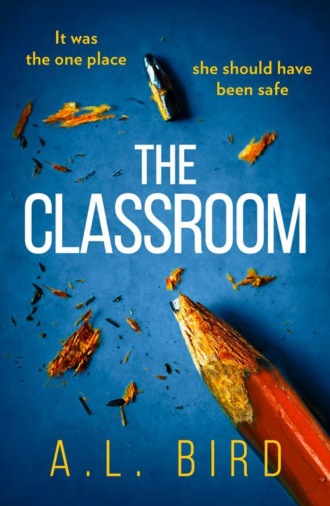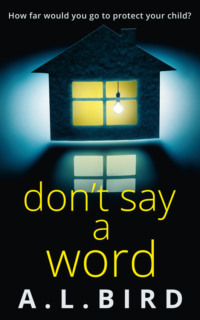
Полная версия
The Classroom: A gripping and terrifying thriller which asks who you can trust in 2018
‘Are you signing up to the drama summer school?’
She’d looked round to see Andy just there, almost kissing distance away. Could smell the minty intrigue of the gum he was chewing. Pulling her gaze away from him momentarily, she followed it to where he was looking. A sign-up sheet for drama summer school, with a few flyers in a little plastic folder pinned next to it.
There were two spaces left on the sign-up sheet. Under Andy’s name.
Becky had smiled shyly. ‘Oh, it’s not really my kind of thing,’ she said, and made to turn away.
‘What she means is,’ came a loud, springy, female voice behind her, ‘she’d love to go, and so would I!’
Caitlin. She grabbed a pen from her ponytail and filled in her own name first, then Becky’s.
‘I went last year,’ Caitlin said. ‘It was amazing.’
That was six weeks ago. Now, the course was only four weeks away. A two-week summer school, with gorgeous Andy. And Caitlin.
‘Get some contact lenses,’ Caitlin had advised her.
But the optician had said there were none suitable for her eye type. Pretty Geeky Freak. Or at least, none that she could comfortably use to look at computers with. So Mum said no. The drama course was expensive enough, and she wouldn’t have Becky ruining her eyes over it.
Still, she could take her glasses off if she ever got close enough to Andy to warrant it. Or he could take them off for her. Caitlin said Becky was still in with a chance – said that’s what she was giggling about with Andy in the cafeteria. Seeing them together had sparked something in Becky’s chest. But Caitlin was a good friend, wasn’t she? So it must be true. You had to trust your friends.
Chapter 4
KIRSTEN, 4 SEPTEMBER 2018
‘Jess, you’re a legend!’
Kirsten takes a sip of the green tea that her PA has put on her desk. She secretly wishes it was coffee, but she’s trying to be more Zen. Come on, brain, arise calm, clear, out of befuddled mummy mode, please.
‘How’s Harriet?’ Jess asks Kirsten.
‘Oh, she’s great – thank you,’ Kirsten says. She knows there’s a blush spreading over her cheeks. She can’t help it – even now, when she talks about her, it happens. It’s like you’re in love, permanently, isn’t it? When you have a kid? And now they know that Harriet will, sadly, be their only child, their little empress, so she gets all that love. After the baby that didn’t … work out. Every day, Kirsten tells her: ‘You’re the best thing that ever happened to us.’ Ian, he always raises an eyebrow when she says that. But despite everything, it’s true. See the silver lining; that’s the motto.
‘It must be tough leaving her all day,’ Jess continues. ‘I know when I have kids …’
She trails off. Kirsten raises an eyebrow. Maybe her PA has remembered Kirsten is her boss, so this is forbidden territory: do not discuss any plans for fertilisation with the one who pays your wages. First female rule of the workplace. Or maybe she remembers that this is the same passive-aggressive ‘why do you work rather than stay at home?’ bullshit that mums put up with on a regular basis, and decides to shut her mouth for the good of the sisterhood.
This is Kirsten’s bugbear. First day at nursery, the keyworker had said to her in front of a teary Harriet: ‘Oh, you must feel so guilty, leaving her here like this.’ Well, thank you, Ms Judgemental. Thank you so much. Kirsten had gone back to her car and cried, more than Harriet ever did. Until they invent a self-paying mortgage, Harriet is going to have to be dropped off in places that emotionally blackmail Kirsten. Good, safe places that will broaden Harriet’s mind.
They did a study, didn’t they, that said girls who go to nursery, and then to school, while their mothers go to work, actually do a whole lot better than those whose parents stay at home? Yes, it got a whole bunch of ridicule in the press. But maybe Kirsten could bring copies to hand out at the school gates (or get the au pair to do it – looks like they’re going to have to get one: she can’t start offering 7.30 a.m. appointments if she has to do the school run).
‘So, are we fully booked today, Jess?’ Kirsten asks.
‘Right up to the brim,’ Jess reports. ‘And the first patient is waiting outside now!’
‘Good. Give me a couple of minutes, and send him in.’
Kirsten needs that two minutes. Because as much as she loves Harriet – and she does, she loves her, she loves her – it takes more than one sip of green tea to go from desperately cajoling: ‘Harriet sweetie, get back in the car, come on now, you know you want to! You don’t need the second purple pencil. One is enough! No, honestly, no one’s going to judge you. We’re going to be late – please, come on!’ to her best calm bedside-manner-infused: ‘Now, what seems to be the matter today?’
But she’s got to. Because it’s a business, this private practice GP surgery. She can’t just rock up like at a NHS practice each morning, with the attitude that people should be so lucky that they’ve got an appointment, and she’ll do what she can but hey! she’s no brain surgeon. Yes, NHS GPs are the front line of medicine. Some surgeries are brilliant. And many GPs are fantastic. But some are struggling. Over-run with patients and paperwork, having to lay down ridiculous rules to reach even more ridiculous targets (Six minutes late? You’ll need to rebook your appointment!) and then giving advice in a rush – it’s tough. Sometimes she’d felt like she was just a gatekeeper for prescriptions, rather than providing meaningful advice. Which was why she left. Set up on her own. Maybe a bit earlier than some people – she could have waited a good decade – but if you have a dream, why delay?
And now, people are paying for a service with more than their tax. They are investing in their health, investing in Kirsten personally, as a service. So she needs to put her mummy service to one side. Not be the nice, slightly harried, always doting but ever failing mummy. She has to be polished, professional Dr White. She puts on her glasses. Slips on her jacket. Lines up the blood pressure monitor neatly on her desk. The desk she herself built from an IKEA flat pack at 1 a.m. the day before the surgery opened. And, of course, makes sure Harriet’s picture is tilted to where the patients can’t see it.
There are pictures of her and Ian too, in the montage Ian had put together for one of their anniversaries. Kirsten and Ian together back when she was a student – how young she looks, particularly next to Ian, who always crashes through the important birthdays long before she does. Then Kirsten and Ian in their climbing gear. She doesn’t angle that frame away. A young, fresh, physically bold couple. A good advertisement for a healthy outdoor lifestyle, if nothing else. What she doesn’t have is a picture of her niece, the one she can’t see anymore. It makes her too sad.
Then the first patient of the day comes in.
And Kirsten is glad she had that calming hot drink. Because it’s a special gut-wrencher, a tear-jerker: the sweetest couple, with fertility problems. Can she help them? And can she prescribe the wife some mild anti-depressants? Because now it’s really starting to affect her sleep. And her ability to function in the world without crying.
Kirsten risks a look at her lovely Harriet’s picture. Beautiful Harriet. Safe and happy at school, now. What a big girl – hard to believe she’s turned five. Someday, the bubble will burst; the picture will shatter, won’t it? The dream of Harriet is too good to be true. She experiences a sudden urge to run out from the surgery, away from this couple with their traumatic failure to conceive, and to go to school and gather up her own gorgeous child.
She doesn’t, of course. Because although Harriet might be the most important thing in the world, this is Work Kirsten. So she stays put, sits, listens, empathises and prescribes, while a little part of her brain rejoices in Harriet, her girl.
Chapter 5
MIRIAM, 4 SEPTEMBER 2018
As they approach mid-morning break, the children are happily drawing pictures of their holidays. Miriam didn’t ask them to draw their families – she felt it would be too upsetting for some of them. Can be a bit unorthodox, the set-up. Sure, everyone’s cool with kids having two daddies these days, but if your first venture into the classroom is to find out you’re completely different, and someone giggles at you, it’s going to mar the school journey, right? Put the children first, not preachy societal values. If she’d learnt nothing else, she’d learnt that.
Besides, it would be upsetting for her too. She knows the family she wants. Her, plus-one. The plus-one being a child. Not just any child, of course. She’d done two short stints at other schools, but there hadn’t been the connection that she feels here. But that experience had, in part, got her this job. Nothing is wasted.
So they do holidays. The EasyJet generation – they’ve all had a summer getaway. Even if it was a staycation, it had to be a cool one. Who knew that five-year-olds went glamping? Or maybe it was just a campsite, and the slightly cash-strapped Brexit worriers have sought to teach their children the socially acceptable face of a muddy tent break.
There are the usual shout outs of ‘We went to Disneyland!’ and ‘Mummy says the only way to fly is business class!’ or ‘The French Riviera is perfect at this time of year!’ (Would the parents be embarrassed or proud if they could hear the precociousness of their children?) Miriam makes sure the quieter ones get a say, too. She walks between the desks, asking about the pictures.
Harriet is covering her drawing, making a little circle round it with her hands and her plaits as she draws. Miriam bends down. She sees the girl up close now. Her hair is not just light brown, it is so many colours: copper, oak, dark blonde, all woven together in those silly messy plaits. But cute little bobbles at the end of each one. Unicorns, they look like. Someone cares about her, then. Someone other than Miriam.
‘May I see your picture, Harriet?’ Miriam asks her gently. Start soft; build the rapport gently. That’s the way to win them over.
She shakes her head vigorously, sending plaits flying out, the unicorns given wings.
‘But surely you want to show me where you went on holiday?’
She shrugs.
‘Well, I’d like to see,’ Miriam tells her. ‘Even if you don’t want to show me.’
Miriam leans slightly closer, and tries to prise one of Harriet’s little hands away from the paper.
Reluctantly, Harriet lets her, and lifts the other hand away too.
Miriam looks at the picture.
At first glance, it’s a playroom. There are lots of toys, and a low-level table. Miriam’s about to ask what her favourite toy is, but then she sees that there’s a little cross on the door, like the ones you see on ambulances.
Miriam’s heart lurches. Oh no! Is this lovely little girl ill? Has she spent the summer at a hospital? Her mind flits back to that summer, years ago. When they didn’t go to hospital when they should have done. After Miriam did what she did. The little girl she misses every day.
‘Where is this?’ Miriam asks her.
‘Mummy’s work,’ she says.
Miriam mentally readjusts.
‘Mummy is a doctor?’ Miriam says, like she didn’t know. Of course, the picture makes sense now. All the parents filled in their jobs on joining forms. And Miriam had read them all carefully. But you have to play the game, don’t you? Just like if you Google someone in the evening, looking for pictures of their kids, imagining being their child’s mummy, the next day you have to make with the questions to eke out answers you already know.
‘Mummy is very busy and I have to play with the toys,’ Harriet says. Poor little thing, thinks Miriam – if only I could give her a big hug, show her some love. Miriam had a teacher who’d done that with her, and she’d never forgotten it.
‘But surely you went away on holiday, too?’ Miriam asks. ‘What about Daddy?’
Harriet shakes her head. ‘Mummy can’t have a break because she works so hard. But Daddy was away, because he does school work all summer even though everyone else spends time with their family, Mummy says. Daddy says Mummy and Daddy would go away together if they could, but not me.’
Alarm bells start ringing. ‘They wanted to go away at the same time, without you? Would you be home alone?’ Miriam wouldn’t have thought at this school, with this child, her first thoughts would be about alerting social services.
Harriet shakes her head and gives her a grin. ‘I’m only five, silly. I can’t stay at home alone, and Mummy wouldn’t let me stay with Granny.’ Thank God. Miriam’s heart rate slows a little. ‘Daddy took me with him for a week, and I watched the big children play.’
Miriam’s heart rate increases again. It sounds like things are not being done right. This is why Miriam needs her own child – to show how things should be done.
‘Was that fun?’ Miriam asks. ‘Did Daddy make time to play with you too?’
But Miriam doesn’t hear the answer because the child on the other side of her announces he needs to do a poo. NOW.
The teaching assistant ushers him out of the room, and Miriam turns back to Harriet but the bell goes, and it’s time for break. The moment’s gone. Harriet, like the rest of the children, jumps up from her seat and rushes out of the room. Before Miriam follows them, she looks again at the picture Harriet has drawn. Fancy spending the summer at your parents’ work and no holiday! It’s not like they lack the cash. Unimpressive. For everything Miriam’s parents didn’t do for her, they at least gave her a holiday. Norway, Holland, France – abroad, but not far flung. Until they flung her out. But then, that was her fault. Or so they said.
Still, this isn’t about her. It really isn’t. It’s about Harriet. And the other children, of course. About making sure they’re all as happy as they can possibly be.
True, the happiest place would be at home with her. But you can’t have too much, too soon.
So for now, if they aren’t happy, then she’ll need to change things. One step at a time.
Конец ознакомительного фрагмента.
Текст предоставлен ООО «ЛитРес».
Прочитайте эту книгу целиком, купив полную легальную версию на ЛитРес.
Безопасно оплатить книгу можно банковской картой Visa, MasterCard, Maestro, со счета мобильного телефона, с платежного терминала, в салоне МТС или Связной, через PayPal, WebMoney, Яндекс.Деньги, QIWI Кошелек, бонусными картами или другим удобным Вам способом.




